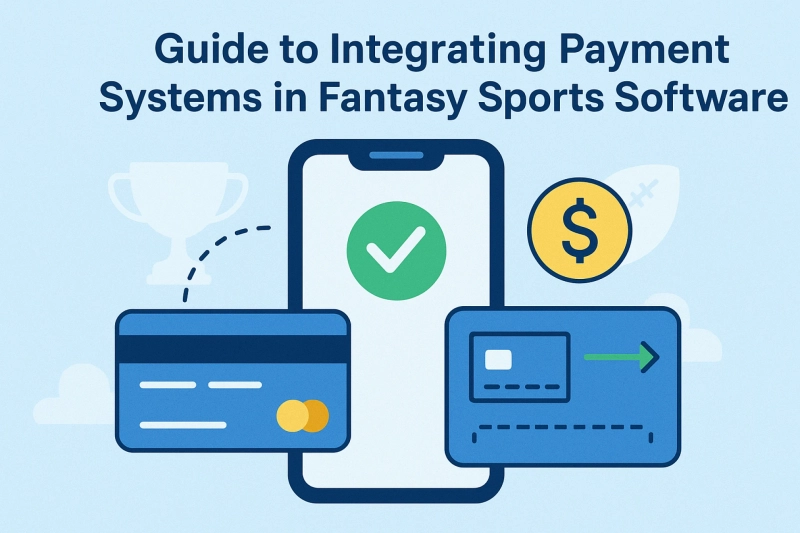In the rapidly growing sports tech industry, seamless payment processing has become a cornerstone for user satisfaction and business success. Whether it’s daily fantasy sports platforms or full-scale fantasy leagues, secure and efficient payment systems play a critical role in monetization and trust-building. For entrepreneurs and businesses investing in Fantasy Sports Software Development, integrating the right payment solutions is not just a technical necessity—it’s a strategic advantage.
This guide walks you through the essentials of payment system integration in fantasy sport software, highlighting best practices, compliance standards, and the latest innovations shaping the industry.
Why Payment Integration is Vital in Fantasy Sports Software
A well-structured payment system ensures that users can deposit money, pay entry fees, and withdraw winnings with ease. In a competitive landscape, where thousands of apps offer similar features, the ability to provide quick and secure transactions often determines user retention.
Key reasons why payment integration is crucial:
- User Trust & Transparency: Players expect complete clarity and security in every transaction, ensuring that both deposits and withdrawals are processed reliably without hidden risks
- Revenue Growth: Smooth transactions encourage repeat participation in contests, especially in daily fantasy sports.
- Global Reach: Advanced payment systems allow users from different countries to transact in their preferred currency and method.
- Regulatory Compliance: Fantasy sports platforms must meet KYC (Know Your Customer) and AML (Anti-Money Laundering) requirements to operate legally.
Key Features of Payment Systems in Fantasy Sports Software
When investing in fantasy sports software development, the payment system should have the following features:
- Multiple Payment Gateways – Integration with popular gateways like PayPal, Stripe, Razorpay, and Paytm to give users flexibility.
- One-Click Deposits and Withdrawals – Speed is crucial, especially in time-sensitive daily fantasy contests.
- Fraud Detection and Security Protocols – End-to-end encryption and AI-driven fraud monitoring safeguard transactions.
- Cross-Border Transactions – Support for multiple currencies to attract global fantasy players.
- Automated Settlements – Instant or scheduled payouts to enhance user satisfaction.
- Digital Wallet Integration – Allowing users to store and manage funds within the fantasy sports app.
Steps to Integrate Payment Systems in Fantasy Sport Software
1. Choose the Right Payment Gateway
The first step in software development is identifying payment gateways that align with your target audience. For instance, a fantasy platform targeting India may prioritize UPI and Paytm, while U.S.-based apps may lean toward PayPal and debit/credit card payments.
2. Implement Secure APIs
Most gateways offer APIs (Application Programming Interfaces) that enable smooth communication between the app and the payment provider. Proper API integration ensures quick transactions without glitches.
3. Ensure Compliance with Financial Regulations
Fantasy sports operators in the U.S. must adhere to federal gaming guidelines like UIGEA to avoid legal complications, while in India, platforms are required to verify users through KYC checks and PAN card authentication to ensure fair play and prevent financial fraud.
4. Add Multiple Transaction Options
To appeal to diverse users, integrate debit/credit cards, UPI, net banking, e-wallets, and even cryptocurrencies (where legal). A variety of options increases user participation in daily fantasy sports contests.
5. Test for Scalability and Performance
Your fantasy sports software development team should stress-test the system to ensure it handles peak traffic during major tournaments like IPL, NFL, or FIFA events.
6. Implement Automated Withdrawal Systems
Delayed withdrawals can frustrate users. Automated settlement systems ensure that winnings are transferred instantly, fostering loyalty.
Challenges in Payment Integration for Fantasy Sports Platforms
While integrating payment solutions in fantasy sport software, businesses often face challenges such as:
- High Transaction Fees – Certain gateways charge steep commissions, which can reduce profits.
- Regional Restrictions – Some payment providers do not support fantasy sports transactions due to local laws.
- Fraudulent Activities – Chargebacks and fake accounts can cause financial and reputational damage.
- Scalability Issues – Payment systems must handle millions of users during global sporting events without downtime.
Overcoming these challenges requires close collaboration with experienced software development teams and reliable payment providers.
Best Practices for Payment System Integration in Fantasy Sports
- Adopt Mobile-First Payment Solutions: Since most fantasy users access platforms via smartphones, mobile-friendly payment options like UPI, QR code scanning, and Apple Pay are essential.
- Offer Transparent Policies: Clearly state withdrawal limits, processing times, and fees to avoid user disputes.
- Incorporate AI and Analytics: Use advanced analytics to detect fraudulent patterns and optimize user payment experiences.
- Continuous Updates: Keep the payment system updated to comply with evolving laws and new digital payment trends.
Future of Payment Systems in Fantasy Sports Software
As the sports tech ecosystem evolves, payment systems will undergo major transformations. Cryptocurrencies, blockchain-based wallets, and biometric payment authentication are expected to dominate the future of fantasy sports software development. These technologies not only improve security but also enhance transparency and speed, which are critical in the fantasy sports industry.
Additionally, the integration of AI-driven fraud detection systems will further strengthen user confidence, ensuring safer gaming experiences.
Conclusion
Integrating a secure, scalable, and user-friendly payment system is the backbone of successful fantasy sports software. From seamless deposits in daily fantasy sports contests to lightning-fast withdrawals, payment systems directly impact user trust and revenue. When businesses integrate secure payment gateways, follow region-specific financial regulations, and adopt modern sports tech solutions, they create a fantasy sports ecosystem that not only drives higher user engagement but also builds long-term loyalty.
If you’re considering launching a fantasy app, collaborating with an experienced Fantasy Sports Software Development company will ensure that your payment integration is smooth, secure, and future-ready.



